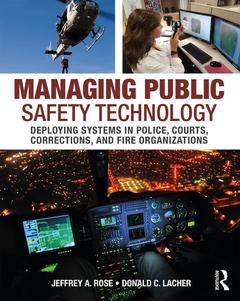Managing Public Safety Technology Deploying Systems in Police, Courts, Corrections, and Fire Organizations
Auteurs : Rose Jeffrey, Lacher Donald

Divided into four sections?public safety agencies, key issues like interoperability and cybercrime, management skills, and emerging trends like the transfer of military technologies to civilian agencies, Managing Public Safety Technology illustrates how essential managing technology is to the success of any project. Based on the authors? years of experience dealing with information systems and other tools, this book offers guidance for line personnel, supervisors, managers, and anyone dealing with public safety technology.
Designed for current or future public safety personnel, especially those in management, Managing Public Safety Technology can also be used for undergraduate and graduate public safety management and leadership programs.
PREFACE
ACKNOWLEDGMENTS
DEDICATION
ABOUT THE AUTHORS
FOREWORD
ACRONYMS
UNIT ONE – OVERVIEW OF PUBLIC SAFETY ORGANIZATIONS
Chapter One: Public Safety Technology
Chapter Two: Law Enforcement
Chapter Three: The Court System
Chapter Four: Corrections
Chapter Five: Fire Services
UNIT TWO – CURRENT PRACTICES IN PUBLIC SAFETY ORGANIZATIONS
Chapter Six: Social Media and Public Safety. What is Your Role?
Chapter Seven: Body-Worn Camera Technology
Chapter Eight: Biometrics and Public Safety
Chapter Nine: Use of Force Technology
Chapter Ten: Predictive Policing
Chapter Eleven: Aviation Technology
UNIT THREE – MANAGING PUBLIC SAFETY TECHNOLOGY
Chapter Twelve: So You Want to Manage Technology?
Chapter Thirteen: The Budget Process and Learning How to Fund Your Project
Chapter Fourteen: Developing the Technology Project
Chapter Fifteen: Do You Really Need This Technology?
Chapter Sixteen: Creating a Project Plan
Chapter Seventeen: How to Acquire Technology
Chapter Eighteen: Installation, Maintenance & Closure of Your Project… The Final Steps
UNIT FOUR – EMERGING TRENDS IN PUBLIC SAFETY TECHNOLOGY
Chapter Nineteen: The Future of Public Safety Technology
Chapter Twenty: Case Studies of Public Safety Technology
APPENDICES
Appendix One: Social Media Terminology
Appendix Two: Information Technology Glossary
Appendix Three: Technology Grant
Appendix Four: Sample Request for Proposal
Jeffrey A. Rose has an extensive background in training law enforcement officers, as well as a bachelor’s degree in human resource management and a master’s degree in education. He has taught numerous courses throughout the country on diverse topics, including criminal justice, administration, budgets, human resource management, and technology. He is a Captain with the San Bernardino County Sheriff Department (California), where he has been a member of the department for over 30 years. Captain Rose has worked in a variety of assignments including Corrections, Patrol, Investigations, Watch Commander, and numerous administrative and managerial positions. He is currently the Commander of one of the largest jails in the State of California, and was previously the Commander of the Emergency Operations Division and the Sheriff Regional Training Center (Academy).
Donald C. Lacher is Chair of the Criminal Justice Management program at the Union Institute and University. He retired at the rank of Captain from the Monrovia (California) Police Department after 31 years of honorable service, including management of both the Services and Operations Divisions. At the rank of Lieutenant he served as the Tactical Response Team Commander, Watch Commander, Detective Bureau Commander, DRE Program Coordinator, and Explorer Advisor. Captain Lacher earned a bachelor’s degree in Criminal Justice from California State University-Los Angeles and a master’s degree in organizational management from the University of La Verne. He is also a graduate of POST Center for Leadership Development-Command College.
Date de parution : 12-2016
18.7x23.5 cm
Disponible chez l'éditeur (délai d'approvisionnement : 14 jours).
Prix indicatif 57,30 €
Ajouter au panierDate de parution : 12-2016
19.1x23.5 cm
Thème de Managing Public Safety Technology :
Mots-clés :
Managing Public Safety; Managing Public Safety Technology; agencies; Public Safety Agencies; law; Public Safety Personnel; enforcement; Public Safety Technology; agency; Law Enforcement Managers; personnel; Mobile Identification Device; organizations; Public Safety Organizations; project; Law Enforcement Agencies; community; Law Enforcement; oriented; Swat; policing; Predictive Policing; Technology Management Process; Community Oriented Policing Services; Thermal Imaging Cameras; Mobile Identification; Super Visor; Job Walk; Fingerprint Examiner; Correctional Facilities; UAVs; DNA Service; Fingerprint Identification; Jail Facility; Law Enforcement Personnel
